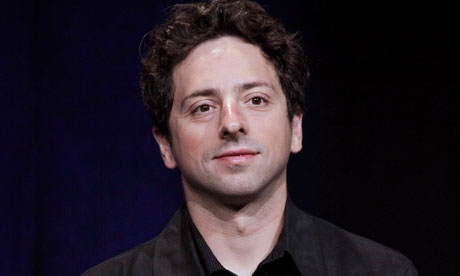
Sergey Brin says he and Google co-founder Larry Page would not have been able to create their search giant if the internet was dominated by Facebook. Photograph: Justin Sullivan/Getty Images
The principles of openness and universal access that underpinned the creation of the internet three decades ago are under greater threat than ever, according to Google co-founder Sergey Brin.
In an interview with the Guardian, Brin warned there were "very powerful forces that have lined up against the open internet on all sides and around the world". "I am more worried than I have been in the past," he said. "It's scary."
The threat to the freedom of the internet comes, he claims, from a combination of governments increasingly trying to control access and communication by their citizens, the entertainment industry's attempts to crack down on piracy, and the rise of "restrictive" walled gardens such as Facebook and Apple, which tightly control what software can be released on their platforms.
"There's a lot to be lost," he said. "For example, all the information in apps – that data is not crawlable by web crawlers. You can't search it."
Rest of story at The Guardian.
More on the battle for the internet:
Revealed: US and China's cyber war games
Washington's plan to beat web censors
China struggle to regain control of the internet
How open is your internet? An interactive map
In an interview with the Guardian, Brin warned there were "very powerful forces that have lined up against the open internet on all sides and around the world". "I am more worried than I have been in the past," he said. "It's scary."
The threat to the freedom of the internet comes, he claims, from a combination of governments increasingly trying to control access and communication by their citizens, the entertainment industry's attempts to crack down on piracy, and the rise of "restrictive" walled gardens such as Facebook and Apple, which tightly control what software can be released on their platforms.
He said he was most concerned by the efforts of countries such as China, Saudi Arabia and Iran to censor and restrict use of the internet, but warned that the rise of Facebook and Apple, which have their own proprietary platforms and control access to their users, risked stifling innovation and balkanising the web.The 38-year-old billionaire, whose family fled antisemitism in the Soviet Union, was widely regarded as having been the driving force behind Google's partial pullout from China in 2010 over concerns about censorship and cyber-attacks. He said five years ago he did not believe China or any country could effectively restrict the internet for long, but now says he has been proven wrong. "I thought there was no way to put the genie back in the bottle, but now it seems in certain areas the genie has been put back in the bottle," he said.
"There's a lot to be lost," he said. "For example, all the information in apps – that data is not crawlable by web crawlers. You can't search it."
Rest of story at The Guardian.
More on the battle for the internet:
Revealed: US and China's cyber war games
Washington's plan to beat web censors
China struggle to regain control of the internet
How open is your internet? An interactive map
No comments:
Post a Comment